

Dan Ariely: What makes us feel good about our work? Behavioural Economics - A Crash Course (Joe Pomykala) Behavioral economics. There are three prevalent themes in behavioral finances:[3] Issues in behavioral economics[edit] Behavioral finance[edit] The central issue in behavioral finance is explaining why market participants make systematic errors contrary to assumption of rational market participants.[1] Such errors affect prices and returns, creating market inefficiencies.
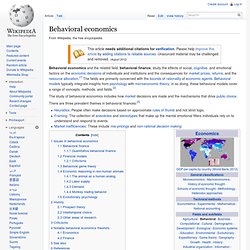
It also investigates how other participants take advantage (arbitrage) of such market inefficiencies. Behavioral finance highlights inefficiencies such as under- or over-reactions to information as causes of market trends (and in extreme cases of bubbles and crashes). Other key observations include the asymmetry between decisions to acquire or keep resources, known as the "bird in the bush" paradox, and loss aversion, the unwillingness to let go of a valued possession. Quantitative behavioral finance[edit] Quantitative behavioral finance uses mathematical and statistical methodology to understand behavioral biases.
Financial models[edit] EDGE MASTER CLASS 2008—CLASS 1. RICHARD THALER: Here is the way Sendhil Mullainathan and I have thought about the day and a half that we have here.
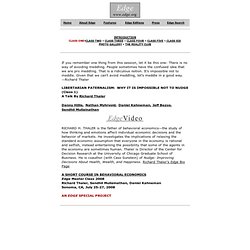
We have a pretty good idea of what we would like to do for the first three of our six sessions. This first session will be an overview of the concept of libertarian paternalism and choice architecture. The second one will flow directly from that, and has an idea, a solution, and we're going to talk about the problem that it may or may not solve. Daniel Kahneman: The riddle of experience vs. memory. Kahneman & Tversky. The Irrationality of Irrationality: The Paradox of Popular Psychology. In 1996, Lyle Brenner, Derek Koehler and Amos Tversky conducted a study involving students from San Jose State University and Stanford University.

The researchers were interested in how people jump to conclusions based on limited information. Previous work by Tversky, Daniel Kahneman and other psychologists found that people are “radically insensitive to both the quantity and quality of information that gives rise to impressions and intuitions,” so the researchers knew, of course, that we humans don’t do a particularly good job of weighing the pros and cons. But to what degree? Just how bad are we at assessing all the facts? To find out, Brenner and his team exposed the students to legal scenarios.
All participants got this background information. Comment / Analysis - Happiness: A measure of cheer. The Book Bench: Is Self-Knowledge Overrated? When Kahneman put this question to a few hundred physicians, seventy-two per cent chose option A, the safe-and-sure strategy.
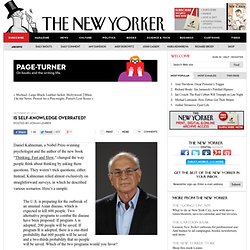
Most doctors would rather save a certain number of people for sure than risk the possibility that everyone might die. The U.S. is preparing for the outbreak of an unusual Asian disease, which is expected to kill 600 people. Barry Schwartz on the paradox of choice. Sheena Iyengar on the art of choosing. Predictably Irrational. Robert Cialdini. Robert B.
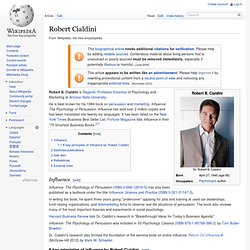
Cialdini is Regents' Professor Emeritus of Psychology and Marketing at Arizona State University. He is best known for his 1984 book on persuasion and marketing, Influence: The Psychology of Persuasion. Influence has sold over 2 million copies and has been translated into twenty-six languages. It has been listed on the New York Times Business Best Seller List. Fortune Magazine lists Influence in their "75 Smartest Business Books. Dan Ariely on our buggy moral code. Dan Ariely asks, Are we in control of our decisions? The Secret to Kicking Procrastination: Reward Yourself. #video_idea_id=20749. Dan Ariely - Why Do Placebos Work?
Mathieu Lehanneur demos science-inspired design. Gamification. Tapping our powers of persuasion. Most psychologists will read this “Questionnaire” with Robert Cialdini, PhD.

That may or may not be true, but according to Cialdini, that statement is powerfully persuasive because we tend to go along with our peers. Cialdini, who retired last year from a teaching and research position at Arizona State University in Tempe, Ariz., is a renowned expert in the science of swaying. In his seminal book on the topic, “Influence: The Psychology of Persuasion” (Quill, 1984), he went undercover to learn the tricks mastered by used-car dealers and Fortune 500 executives alike, bringing persuasion research to psychology’s forefront. Cialdini distilled his findings into six “weapons of influence,” each grounded in how we perceive ourselves or others: Reciprocity: We inherently want to return favors.
In recent years, Cialdini has been leveraging those weapons to address major world problems such as climate change by persuading people to reduce energy use. I think it’s a little too early.
The Psy-Fi Blog. Unit Bias: Cooking, Dieting and Investing. Feast and Famine Cooking is, of all the inventions that have propelled mankind to the top of the food chain, probably the most important.
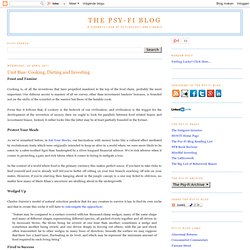
Our dubious ascent to mastery of all we survey, other than investment bankers’ bonuses, is founded not on the skills of the scientist or the warrior but those of the humble cook. From this it follows that, if cookery is the bedrock of our civilisation, and civilisation is the trigger for the development of the invention of money, then we ought to look for parallels between food related biases and investment biases. Indeed, it rather looks like the latter may be at least partially founded in the former. Protect Your Meals As we’ve remarked before, in Eat Your Stocks, our fascination with money looks like a cultural effect mediated by evolutionary traits which were originally intended to keep us alive in a world where we were more likely to be eaten by a sabre toothed tiger than bankrupted by a silver tongued financial advisor.
Wedged Up.